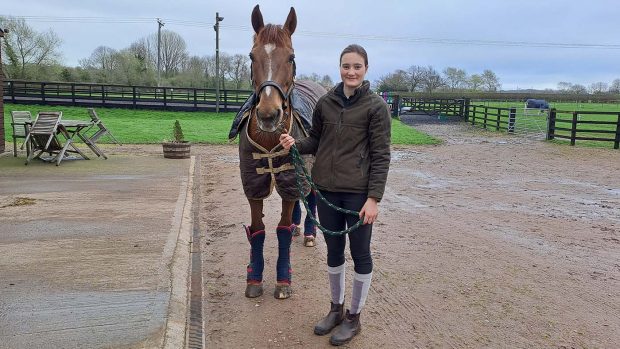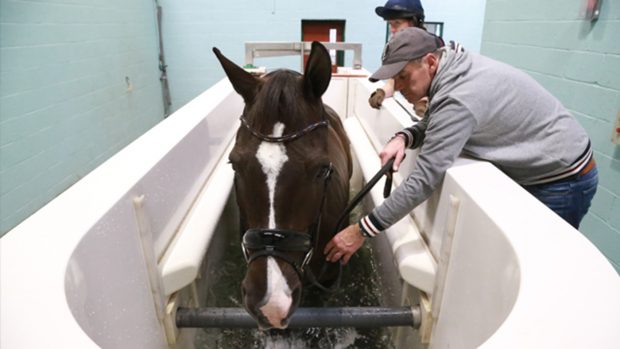To mark Horse & Hound’s education special (magazine on sale Thursday 13 June), in which a number of top riders share their college and university experiences, here’s all you need to know about how you can make the most of a variety of riding opportunities while at university, whether you’re novice or experienced, even if you don’t have your own horse...
When attending a fresher’s sports club fair at a university or college, freshers quickly realise that no matter what institution they’ve gone to, there are dozens of sports they can try, from polo to mountaineering. It can be a bit daunting, but for anyone interested in equestrianism, from students who’ve never ridden a horse but want to, to students who had to leave a horse at home but want to keep riding, universities provide fantastic opportunities to get involved with horse sport.
Over 160 UK universities and colleges have equestrian clubs. These cater for everyone — the novices who have never been near a horse and the experienced competitors alike. They open doors for people who could not afford a horse and indeed, having one at uni is of no real advantage in most clubs.
In order to find out more about joining the clubs and learn about the opportunities they provide, H&H spoke to people on the committees of the riding clubs at Glasgow University, Leeds University, and Newcastle University
The way most people get involved is signing up at the university’s freshers week. Aoife Carr, the captain of the Glasgow University riding club (GURC), explains: “We offer a taster session at the start of term and then a sign-up evening shortly after, where the committee takes membership details and people sign-up to the appropriate lesson on a doodle poll document, which is monitored by our committee.”
She adds: “It is a great opportunity to start something completely new at university or to continue your horsey fix. GURC has a lot to offer in all aspects of horse riding, from weekly lessons, leisurely hacks, educational events, amazing socials and inter-university team competitions for the riders with a more competitive streak. We have members in the club who have never ridden before, as well as riders who compete regularly.”
Sarah Ragg, the president of the Newcastle University club, explains: “As a club we offer both social lessons for all abilities and then for more advanced riders we take part in BUCS (British Universities & Colleges Sport) competitions against other universities, which we hold trials for.”
Newcastle students can chat with the committee during the fresher’s fair, then sign up and pay via the student union.
Lucy Bennett, the secretary of the Leeds University club, illustrates a wide range of activities club members can participate in: “We offer lessons for all levels beginners to advanced, we also offer horseball and twice a year we have gymnkhana games, we have lots of socials such as bowling, nights out and wine and cheese nights, we’ve done trips before to places like Horse of the Year Show and a holiday to the Isle of Man.”
Any student riding club offers affordable lessons. This is a significant benefit of joining one, and they’re really for everyone, not just people who rode prior to university. While some institutions such as Hartpury have their own equestrian facilities, the vast majority of universities and colleges partner with nearby riding schools.
Aoife explained: “We are very lucky to have a deal with our local riding centre, Busby Equestrian Centre which removes the massive barrier of having to own a horse to participate.”
Glasgow students pay £19 for lessons, a bargain as anyone who has ever paid for a riding lessons knows. Any university or college club will have similar arrangements for providing members with discounted lessons.
Lessons range from beginners to advanced, Aoife saying: “We offer four lesson levels; beginners (those with little or no experience), novice (those who can walk and trot confidently and are learning to canter), intermediate (those who can walk, trot and canter confidently and are learning to jump) and advanced (those who can walk, trot and canter confidently and are jumping 90cm).” She adds: “On top of the four levels, we have our team riders made up of our competitive riders which compete on our four BUCS teams.”
The BUCS competitions are a big part of the uni clubs’ life. These intercollegiate shows are distinctive from other equestrian competitions because competitors do not need their own horse. Instead, they ride horses at the venue where they are competing (the Intercollegiate Horse Shows Association, the United States equivalent, uses a similar system). It levels the playing the field — it no longer matters who has the flashiest mover or the neatest jumper — and completely removes the barrier of owning or loaning a horse. Even if you have your own horse, you can’t ride it at BUCS shows.
I ask Aoife how BUCS works, and she explains the rather complicated system: “There is four in a team and each member competes in both the showjumping and dressage. A draw on the day is used to determine which horse you will ride. Warm up time is limited to eight minutes for dressage and four jumps for showjumping and is strictly timed. The dressage and showjumping are both judged on style and worked into penalty points and the rider and team with the least penalty points win.”
So yes — you have to pilot a horse you’ve never met in your life through a dressage test or over a showjumping course, after only riding it for a few minutes beforehand. It’s a real test of horsemanship.
Unclear on how this works for dressage scoring, I ask for clarification, and Aoife explains: “It is dependent on how the other people do on the same horse as you drew. The person who gets the highest score e.g. 189 points gets zero penalties. And the second person with 184 points would get five penalties and so on.” In other words, riders are scored against one another based on how well they ride their assigned horses.
The dressage tests are around BD novice level, but BUCS has its own tests, and Sarah from Newcastle explains: “The jumping stage is for everyone, no matter what how you did in the dressage, jumping at least eight jumps up to 85cm.”
Teams that do well on the BUCS circuit get to compete at nationals. This year, it was held at Bishop Burton in Yorkshire (2-5 June), with Exeter, Kings and Oxford placing in the top three for the dressage rounds.
There is also the chance for the best national BUCS competitors to represent Great Britain on the national student riders squad, enabling team members to compete against other nations abroad.

Great Britain student riders world finals Poland 2017
There’s more to student riding clubs than cheap lessons and competitions. As with most uni clubs, the social side is a fundamental part of club life. They have weekly pub nights and provide other opportunities for fun, horsey activities.
Aoife says: “We offer equine events, such as days out with Clydesdales and various eventing and showjumping demos. We are also aiming for a recreational show for our riders as well.”
Lucy, the secretary of Leeds, says there is bowling, a trip to HOYS, and horseball.
At Newcastle, there are of course pub socials, but Sarah emphasises there were non-drinking socials as well, including a beach ride, bowling, and having meals out.
While most uni riding clubs are more or less focused on the Olympic disciplines, polo clubs, affiliated with SUPA (Schools and Universities Polo Association), have been established at 61 universities and colleges in England, Wales, Scotland, and Ireland.
No matter what club you join, university polo is the cheapest polo anyone can play, and the clubs and SUPA itself actively encourages beginners to give it a go. At St. Andrews University, for instance, they state that they welcome players of all abilities, training at Kinross Polo Club with an HPA qualified coach. They even play on the beach.
As an indication of the prices students can expect, the Cardiff University Polo club charges £20 to join and £200 for a package of six lessons, while Nottingham offers blocks of lessons for £300, and Bournemouth has a membership fee of £30 and lessons for £45 each (but riders only need to commit twice per month).
On their website, SUPA explains: “[We] organise and run seven national tournaments in all the levels at various polo clubs throughout the country as well as organising the SUPA International Festival in early July, where SUPA hosts incoming international teams as well as featuring matches with our best ladies, schools and university players. Over the past few years international teams included Hungary, Poland, Italy, Dubai, France, West Indies, New Zealand, Kenya, India, Chile and Argentina.”
There are also friendly competitions and winter (arena) competitions throughout the year for players to hone their skills.
As with the dressage and jumping-focused riding clubs (and indeed, most uni sport clubs), the polo clubs provide plentiful opportunities for their members to socialise, with pub nights out, day trips to equestrian events, and other fun activities, like bowling and meals out, off the polo field.
Joining a club can define the university or college experience as much as the academics, maybe more. It becomes the hub of members’ social life, a connected community in this fractured, digital age where we need interpersonal connections more than ever. And because club committees are always run by students, elected every year, it gives people an opportunity to develop leadership and (sometimes) problem-solving skills before they graduate.
Continued below…

How to get involved with or create a school riding team
If you would like your school to set up an equestrian team, here’s everything you need to know

Subscribe to Horse & Hound magazine today – and enjoy unlimited website access all year round
When I asked what the riding club meant to her, Lucy said: “I’m graduating this year after four years and the riding club has been such a large part of my university experience. I’ve had so much fun being on teams and the committee, the best part is meeting people. When you join it’s like having a whole friendship group ready-made of like-minded people. I’ve made friends for life here and had so much fun.”
Sarah added: “The [Newcastle] club played a massive part of my second year, giving me a chance to meet so many new people who had similar interests as me. Now being voted as president it is going to give me the opportunity to enhance my leadership and communication skills. I couldn’t recommend joining an equestrian club more as I now consider the members of the club as my closest friends at university!”
For all the latest equestrian news and reports, don’t miss Horse & Hound magazine, out every Thursday, and in the latest issue, out today (13 June), you can read our education special




